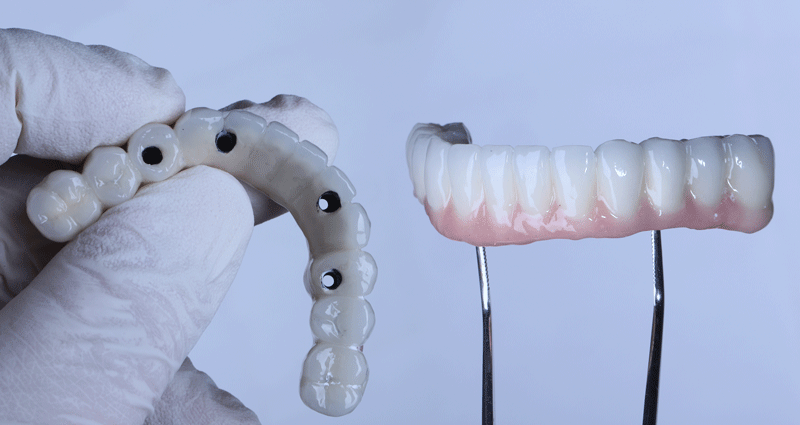Understanding Dental Implants: How and When You Can Get All Your Teeth Replaced

Losing a tooth or multiple teeth can significantly impact daily life, from difficulties in chewing to diminished self-confidence. Fortunately, complete tooth implants provide a long-lasting and reliable solution, closely replicating the natural structure of teeth. Unlike traditional dentures or bridges, implants replace both the root and crown, ensuring a stable foundation that enhances both function and aesthetics. This advanced dental restoration method offers unmatched durability, allowing patients to enjoy a seamless, confident smile.
A complete tooth implant consists of three essential components: the titanium implant post, an abutment, and the dental crown. The implant post is surgically embedded into the jawbone, where it integrates through a natural healing process known as osseointegration. This fusion process provides remarkable stability and long-term support. The abutment serves as a connector, securing the custom-made dental crown, which is carefully crafted to match the surrounding natural teeth. Together, these elements create a natural-looking and highly functional replacement tooth that restores both oral health and appearance.
The Transformative Benefits of Complete Tooth Implants
The advantages of complete tooth implants extend beyond simply replacing missing teeth—they enhance oral health, functionality, and overall well-being. One of the most significant benefits of implants is their ability to preserve jawbone density. When a tooth is lost, the surrounding bone can begin to deteriorate due to lack of stimulation. Unlike traditional dentures that sit on the gums, implants stimulate the bone, preventing long-term bone loss and maintaining facial structure.
From a functional perspective, complete tooth implants provide a level of stability and strength unmatched by other tooth replacement options. Traditional dentures can slip or cause discomfort while eating or speaking, whereas implants remain securely in place, allowing for normal biting force and unrestricted food choices. Additionally, because implants integrate with the jawbone, they help maintain proper bite alignment, preventing surrounding teeth from shifting into empty spaces and ensuring a well-balanced, natural-looking smile.
Important Considerations Before Choosing Dental Implants
While complete tooth implants are a highly effective solution for tooth replacement, not all patients are immediate candidates. Several factors influence eligibility, including gum health, bone density, and overall medical history. Ideal candidates should have healthy gums and sufficient bone volume to support the implant. In cases where bone loss has occurred, bone grafting procedures may be required to create a strong foundation before implant placement.
Additionally, certain medical conditions, such as uncontrolled diabetes or autoimmune disorders, can impact healing and the success rate of implants. It is essential to discuss your full medical history and lifestyle habits with your dental specialist to determine the best course of action. Smoking and excessive alcohol consumption can also hinder recovery and should be addressed before proceeding with implant treatment. A thorough consultation with an experienced implant provider ensures a personalized approach that aligns with each patient’s unique needs.
The Step-by-Step Process of Receiving a Complete Tooth Implant
The journey to a fully restored smile with complete tooth implants involves multiple carefully planned stages. The first step is an in-depth consultation, where your dental provider evaluates your oral health, takes digital images, and determines the best treatment plan. Once you are deemed a suitable candidate, the implant placement procedure is scheduled. During this minor surgical procedure, the titanium implant post is placed into the jawbone under local anesthesia, with sedation options available for added comfort.
Following implant placement, a healing period of several months allows for osseointegration—the process where the bone fuses with the implant, creating a stable foundation. Once fully integrated, the next step involves placing the abutment, which connects the implant to the final restoration. Finally, a custom-made dental crown is securely attached, designed to blend seamlessly with your natural teeth in both shape and color. The result is a fully functional, aesthetically pleasing tooth replacement that can last a lifetime with proper care.
Long-Term Maintenance and Finding the Right Dental Provider
Ensuring the longevity of a complete tooth implant requires a commitment to proper oral hygiene and regular dental checkups. Brushing, flossing, and using antibacterial mouthwash help maintain gum health and prevent infections around the implant site. While implants are resistant to decay, surrounding gum tissue must remain healthy to support long-term stability. Routine dental visits allow your provider to monitor implant integrity and address any concerns before they develop into serious issues.
Choosing the right dental implant provider is essential to achieving the best results. An experienced specialist with advanced training in implantology can ensure precise placement, optimal healing, and aesthetically pleasing results. At Ferber Dental Group, we utilize cutting-edge technology and personalized treatment planning to provide superior dental implant solutions. Our team of skilled professionals is dedicated to guiding patients through every step of the process, ensuring comfort, confidence, and exceptional outcomes.
Schedule your consultation today with Dr. Brian Ferber and our exceptional team. Let us help you achieve the smile of your dreams! Call us now or visit our website to book an appointment.





